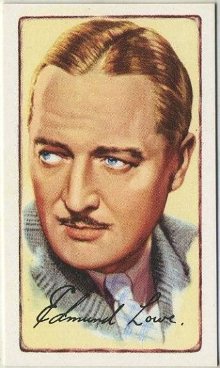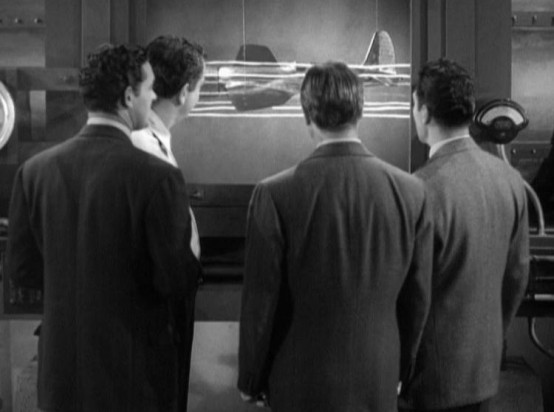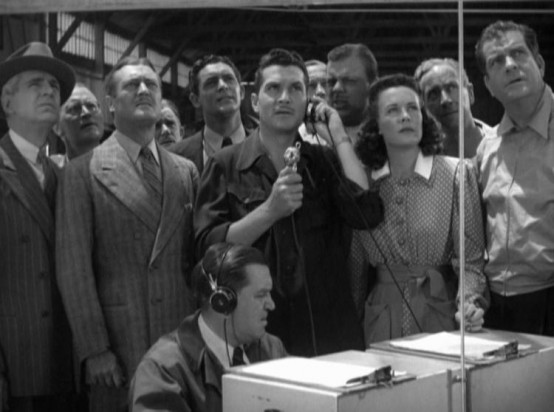Four stars share billing on RKO’s Men Against the Sky, and that seems about right.
Richard Dix is the best known of the four, and is cast in the most glamorous role in the film, as alcoholic former “Ace of Aces,” Phil Mercedes. Men Against the Sky came a couple of years into Dix’s return to RKO, the studio that propelled him to his greatest talkie fame when he starred in Academy Award winning Best Picture Cimarron back in 1931. Ace of Aces (1933) was another popular role for Dix during his first stay with the studio—I think his best performance—and they play directly off that past success with his nickname in Men Against the Sky.
While Dix is not portraying the same character that he played in the earlier film, which was set during World War I, he is once again cast as the “daredevil of the skies.” But this time it’s a washed-out former ace who we meet on a barnstorming tour at the open of Men Against the Sky.
It’s not hard to imagine Rocky Thorne from Ace of Aces developing into someone very similar to Phil Mercedes, especially if you fill in the twenty-plus years between their stories with a lot of disappointment and disillusionment. Mercedes had returned from overseas to become a record-setting star during the 1920s, another Lindbergh racing to become first and fastest over land and sea. After the novelty of such flights wore off and the public stopped caring, he took work that many veteran fliers took during the ’30s, flying the mail. After losing that job Mercedes barnstormed America’s small towns looking to cash in on past fame at discount rates.
Mercedes is immediately grounded by alcoholism in Men Against the Sky. Dix is a favorite actor of mine, but I admit he overplays being drunk. We are supposed to take Mercedes’s alcoholism seriously, but Dix is so over the top that I found myself chuckling. Pretty sure he didn’t intend that, so it’s good that these scenes are limited. His affliction is portrayed as the continued cause of all of his current troubles, and something to be overcome. This is 1940, so alcoholism is still considered a character flaw, not a disease.
Wendy Barrie plays Dix’s supportive younger sister, Kay, and links Phil’s story to the happenings at the McLean Aircraft Corp., where she falls in love with chief engineer, Martin Ames, played by Kent Taylor.Barrie and Taylor had become something of a team by this time of their careers, having appeared opposite each other in films not just at RKO, but previously for Universal and as far back as 1935 in Paramount’s College Scandal. After Men Against the Sky they were paired a seventh and final time by RKO in Repent at Leisure (1941), but they are best recalled together when stranded with Chester Morris, Lucy, and co. in 1939s Five Came Back, also at RKO. In Men Against the Sky Barrie’s Kay pursues the Taylor character, Martin, first to secure a job for her grounded brother, but almost as quickly with romantic intentions. Martin, meanwhile, tries to stay focused on the business at hand, getting the plane he’s designed up in the air, but can’t helped to be disarmed by Kay and soon returns her affections.
Rounding out the quartet is one of Dix’s peers from the silent screen, Edmund Lowe, who plays the company’s egotistical owner, Dan McLean.Lowe’s greatest screen achievement came as Sgt. Quirk opposite Victor McLaglen’s Captain Flagg in silent classic What Price Glory (1926). Lowe and McLaglen were reteamed many times over the years, and while this association is what is most remembered about Lowe, his best modern exposure comes in a supporting role in Dinner at Eight (1933), where he plays the doctor who’s having an affair with Jean Harlow’s character. In addition to these roles Lowe played many leads of an urbane type, similar to William Powell, throughout the 1930s. Casual fans may not recognize him by name, because most of his work was done at studios whose product is harder to view today: 20th Century-Fox, Paramount, and Universal.
Lowe makes the brash McLean a funny character, despite many negative traits. The married McLean, who even admits at one point that his wife’s money funded his business, constantly chases women and claims full credit for the labors of his employees despite being absent from the office at key intervals. He even combines his faults when, at a critical time on the project, he disappears to San Francisco, where he’s spotted with “a blonde on each arm and one in his hair.” At least he broke free long enough to send a test pilot back to Ames and the company! McLean is so transparent and cocksure that everybody still loves him anyway.
Men Against the Sky blends these four personalities into an exciting and often funny film. On its own, the Taylor-Barrie romance wouldn’t have been enough, and the Dix storyline would have been overly morbid. Lowe is more of a supporting actor despite his share of the billing, but he’s enough of a force of personality to make up any difference in importance to the other three leads. While the aeronautics setting is interesting, that is mostly so because it is weaved around these four main personalities. Director Leslie Goodwins balances these elements with an occasional air sequence for excitement and helps elevate this little “B” film above its expected status. A script from Miss Lonelyhearts and The Day of the Locust author, Nathanael West, surely didn’t hurt either.
Bosley Crowther of the New York Times seemed to like the film despite himself, remarking, “There must be something strangely engrossing about the details of airplane construction these days,” and damning the story as “routine and obvious,” the performances as “stock and pedestrian,” and the production for being “labeled low-budget all over,” yet conceding that Men Against the Sky was a “generally entertaining little action picture,” and “a surprisingly lively agitation.”
The Showmen’s Trade Review remarked that is was, “the first in the new cycle of airplane pictures,” adding, “if the others are produced as well, we’re in for some swell entertainment. This one is a natural for present times, when everybody is air-minded, and will please both the youngsters and grownups alike.”
Roscoe Williams of Motion Picture Daily also praised the film, while commenting on its timeliness:
“Keyed to the changed public attitude toward aviation resulting from publicity given the industrial aspects of the subject in recent months, this story about the men who build planes and fly them, filmed without furbelows and acted by a cast of capable players, attains more dramatic impact than most of the glamorized, romanticized treatments of the subject produced in the years when planes were popularly regarded as risky toys.”
As each of those review snippets mention, this was a high profile time for the air industry. Recent bureaucratic changes at home and the ongoing war in Europe had indeed made the public air-minded by the time of Men Against the Sky’s September 1940 release.
Just before the film went into production, the Civil Aeronautics Authority (CAA), an independent government bureau created when the industry was reorganized under the Civil Aeronautics Act of 1938, was split into two agencies. The Civil Aeronautics Administration and the Civil Aeronautics Board (CAB). The Colonel who attended McLean’s test flight would have been from the CAA, the body which oversaw aircraft certification and safety enforcement, among other responsibilities. The CAA continued to regulate the US air industry until the 1958 formation of the Federal Aviation Administration (FAA).
While several highly publicized air crashes had originally been what led to the reorganization of the industry in the late ‘30s, war in Europe kept them in the news. The U.S. had been supplying planes to Britain and France since 1939, but on May 16, 1940 President Roosevelt brought the subject home in calling for a massive increase in production for the sake of America’s own national defense. “With the amazing progress in the design of planes and engines, the airplane of a year ago is out-of-date now. It is too slow, it is improperly protected, it is too weak in gun power,” he said, before calling for an increase in production from 12,000 planes per year to 50,000.
This is why the McLean Aircraft Corporation needs to produce the fastest and safest plane possible. Men Against the Sky refrains from political propaganda, though it would have been implied to a 1940 film audience. But despite the headlines, Men Against the Sky is not a film about patriots, it’s a film about creativity, capitalism, and redemption.
Martin Ames (Taylor) and the men working under him are the creative talent who work to build a plane for their boss, Dan McLean (Lowe), best described as a businessman or entrepreneur. McLean is very hands-on with the business. He loves planes too, but by this time has too much at stake to consider much more than the business end of the enterprise. After the banks refuse to extend further credit to McLean, one of the bankers, Mr. Burdett (Granville Bates), returns on his own to capitalize on the situation.
Burdett states that he has absolutely no interest in aviation, only money. Given the timing of the film it’s surprising that Bates is allowed to make Burdett more cuddly than crude. He’s stuffy, sure, and as much as his investment is required, he is often presented as an obstacle, but Burdett is also allowed to be funny. Rather than coming off as some sort of vampire looking to drain profit at any expense, he’s an all-around square guy, who plays fair as long as the numbers add up tolerably to his concern. It’s an unusual character, as practically everything about Burdett almost certainly casts him as the villain. Instead he’s one part buffoon, but mostly comedy relief. Granville Bates puts the part over in such admirable fashion that I wouldn’t have balked had his been a fifth name added to the initial credits.
 Men Against the Sky works whether you view it as an aviation film, a general actioner, or even just a Richard Dix movie. All four, even five, of the main characters are entertaining and enjoyable enough that you don’t miss your favorites too much when the story takes time to concentrate on the others. They do insert a villain, Donald Briggs as test pilot Allerton, but the movie didn’t even need him because our characters are too busy fighting against time and technology for redemption and success. Given the 1940 release date, it’s worth mentioning that this is not a war movie, nor even so much a war production film. Men Against the Sky is really just another aviation story, but a better than average one.
Men Against the Sky works whether you view it as an aviation film, a general actioner, or even just a Richard Dix movie. All four, even five, of the main characters are entertaining and enjoyable enough that you don’t miss your favorites too much when the story takes time to concentrate on the others. They do insert a villain, Donald Briggs as test pilot Allerton, but the movie didn’t even need him because our characters are too busy fighting against time and technology for redemption and success. Given the 1940 release date, it’s worth mentioning that this is not a war movie, nor even so much a war production film. Men Against the Sky is really just another aviation story, but a better than average one.
Good entertainment. Action and drama with touches of romance and comedy. Top performances from Edmund Lowe and Granville Bates. The usual sturdy stuff from Richard Dix, at least when Mercedes is sober. Wendy Barrie and Kent Taylor keep up with the more experienced actors.
Men Against the Sky is also covered at Laura’s Miscellaneous Musings, where Laura looks at points I overlooked (Kay’s breaking into a male-dominated industry) or couldn’t neatly fit (the use of Howard Hughes’s H-1 Racer).
Men Against the Sky is available as a manufactured on demand DVD-R from Warner Archive HERE. My thanks to Warner Archive for providing a review copy for this article. Screen captures from that disc were used to illustrate this post.
Sources:
- Crowther, Bosley. Rev. Of “Men Against the Sky.” New York Times. 12 September 1940.
- “The Box Office Slant.” Showmen’s Trade Review. 24 August 1940: 27.
- Williams, Roscoe. “Hollywood Review: Men Against the Sky.” Motion Picture Daily. 22 August 1940: 3.














Thank you so much for the link, Cliff! Loved your post and all the info. Didn’t realize Barrie & Taylor worked together that often!
Best wishes,
Laura
Thanks, Laura. I knew they were in Five Came Back and one of the old Hollywood trade magazines referred to them as an RKO team when discussing their next (and final) release together after this one. I was surprised to check IMDb and see they were paired often at Universal and as far back as ’35. I know her better than I do him, but I thought he was pretty good in this one.
Thanks for the added info! Taylor is someone I’ve been gradually coming to appreciate as I come across his movies. A few months ago I caught him in a Lippert crime film from later in his career, then saw this and rewatched FIVE CAME BACK a few weeks ago. Will be looking for more of his work.
Best wishes,
Laura
I was surprised how busy he was earlier in the ’30s. I’ve never really noticed him before, but I think the recent Five Came Back/Men Against the Sky combo has finally made me aware enough to start looking for yet another (now) familiar face!